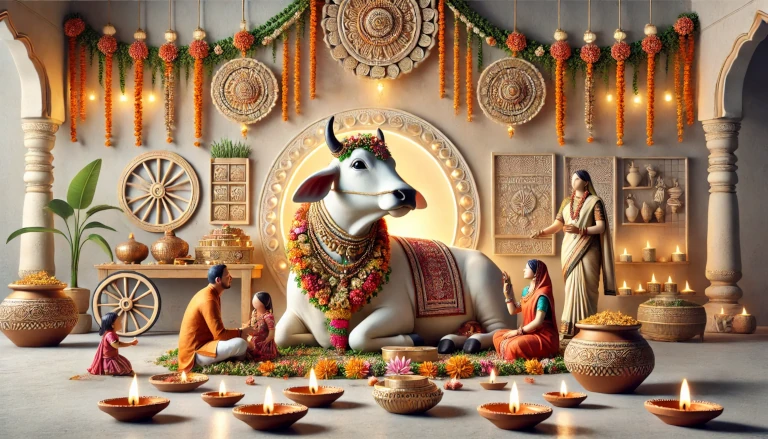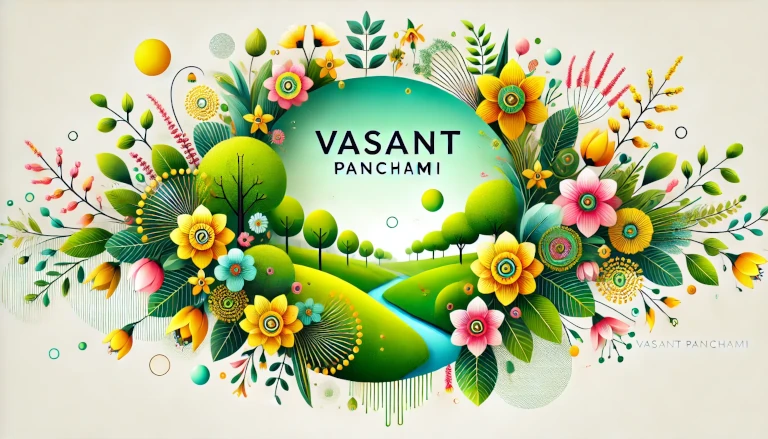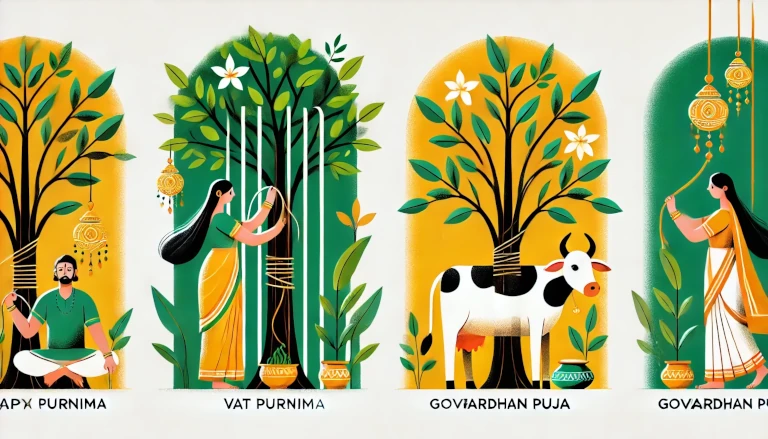Vasu Baras, also known as Govatsa Dwadashi, is celebrated primarily in Maharashtra and other parts of India. It marks the beginning of the grand Diwali festival, one of the most significant celebrations in Hindu culture. This day is dedicated to worshiping cows, which are regarded as sacred in Hinduism. The festival celebrates the deep connection between cows and humans, particularly in agrarian societies where cows play a vital role in livelihoods, sustenance, and prosperity. In this article, we will explore the significance, traditions, and rituals associated with Vasu Baras.
What is Vasu Baras? 🐄
Vasu Baras, also referred to as Govatsa Dwadashi, is the day dedicated to worshiping cows, which are revered as symbols of wealth, nourishment, and fertility. In Hinduism, cows are believed to be sacred, as they provide essential resources like milk and ghee. Vasu Baras is primarily celebrated to honor these animals, and it holds particular importance in households that depend on cattle for agricultural and economic activities.
Why is Vasu Baras Celebrated? 🌟
Cows are often associated with Goddess Lakshmi, the goddess of prosperity, and Lord Krishna, who is fondly remembered as a cowherd. The festival is meant to express gratitude for cows and acknowledge their contributions to the economy, agriculture, and nourishment of human life.
In agrarian cultures, cows are seen as providers of sustenance and nourishment, and worshiping them symbolizes gratitude for these gifts. Vasu Baras is also a celebration of the bond between humans and animals and the interdependence between nature and people.
When is Vasu Baras Celebrated? 📅
Vasu Baras is celebrated on the twelfth day of the Krishna Paksha (waning moon) in the Hindu month of Ashwin. It usually occurs a few days before the main Diwali celebrations. This day marks the beginning of Diwali festivities, and it is the first in a series of rituals leading up to the grand festival of lights.
Where is Vasu Baras Celebrated? 🏞️
Vasu Baras is primarily observed in Maharashtra but also celebrated in other parts of India, especially in regions with agricultural communities. In rural areas, where cattle play a central role in farming, Vasu Baras holds particular importance. However, urban dwellers also observe the festival to honor tradition and cultural values.
How is Vasu Baras Celebrated? 🎉
The celebration of Vasu Baras revolves around the worship of cows. Here’s how the festival is typically observed:
- Bathing and Decorating the Cow: The cows are bathed early in the morning, and their horns are painted with bright colors. They are decorated with flower garlands, and their foreheads are adorned with kumkum and turmeric.
- Prayers and Offerings: Families offer prayers to the cows, offering them special foods such as jaggery, wheat, and fruits. The cows are fed well, and in many homes, the cow is treated as a member of the family during the festival.
- Circumambulation: One of the main rituals is pradakshina, where devotees walk around the cow in a clockwise direction while offering prayers. This act symbolizes seeking the cow’s blessings for wealth, health, and prosperity.
- Special Poojas: Women perform specific poojas (prayers) dedicated to cows, praying for the well-being of their families and seeking prosperity.
Traditions and Significance of Vasu Baras 🪔
Cows in Hindu Tradition: Cows have always held a special place in Indian culture. They are not only a source of food (milk) but are also essential in agriculture, providing manure for crops and sometimes used as draft animals in farming. Vasu Baras signifies the importance of cows in daily life, especially in rural communities.
Goddess Lakshmi and Cows: In Hindu mythology, cows are often associated with Goddess Lakshmi, and offering prayers to cows during Diwali is believed to bring prosperity and wealth to the household.
Krishna’s Connection: As a child, Lord Krishna spent his early years as a cowherd, which is why cows hold special significance in the celebration of Vasu Baras. Worshiping cows is also a way to honor Lord Krishna’s love for these sacred animals.
Examples of Vasu Baras Traditions in Rural Areas 🏞️
In rural parts of Maharashtra, cows are revered as central figures in agricultural life. During Vasu Baras:
- Families wake up early to prepare for the day’s rituals, ensuring that their cows are clean and well-fed.
- Temples in villages host special poojas, where large groups gather to offer prayers collectively.
- Cow owners sometimes organize feasts for the community, offering a portion of the cows’ produce to others as a symbol of shared prosperity.
Vasu Baras and its Environmental Significance 🌿
Vasu Baras, beyond its religious and cultural importance, also highlights the environmental significance of living in harmony with nature. By celebrating the contributions of cows, the festival promotes sustainable practices in agriculture and encourages a deeper respect for animals and their role in the ecosystem.
As we continue to modernize, it is important to preserve traditions like Vasu Baras, which not only enrich our cultural heritage but also remind us of the importance of eco-friendly and sustainable practices. By maintaining a balance between cultural customs and environmental consciousness, we can celebrate Diwali in a way that honors both tradition and nature.
Read this in Marathi at वसुबारस: दिवाळीच्या पहिल्या दिवसाचे महत्त्व, परंपरा, आणि साजरीकरण
Discover more from Green Ecosystem - Renewable Energy, Agriculture, and Environmental Sustainability
Subscribe to get the latest posts sent to your email.


